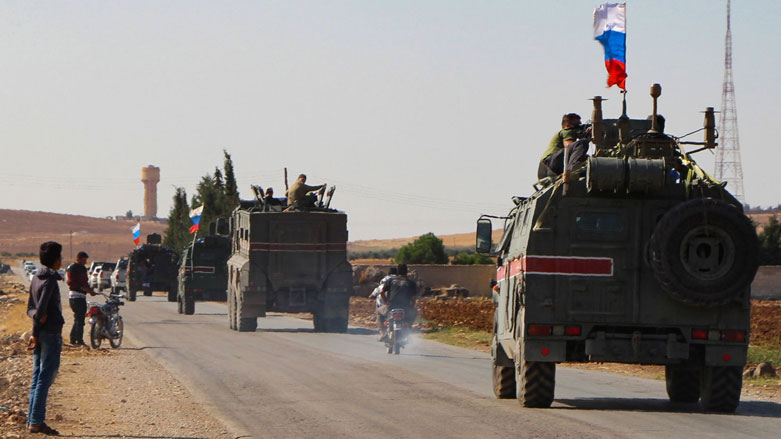ERBIL (Kurdistan 24) – Russian President Vladimir Putin claimed on Friday that his nation’s military police now deployed in northern Syria is loved by local Kurds there because it’s clear that its mission is to provide protection for them.
He made the comments at a meeting of Russia’s Nationalities Relations Council, as reported by the Tass News Agency.
Turkey’s cross-border invasion into northern Syria targetting the US-backed, Kurdish-led Syrian Democratic Forces (SDF) that began on Oct. 9 has caused the reported death of hundreds and displacement of hundreds of thousands. Both Turkish and Syrian militias backed by Ankara have been accused of war crimes by international human rights organizations.
On Oct. 22, Russia and Turkey signed the Sochi Memorandum which supports the Turkish plan for a withdrawal of the SDF to territory 30 kilometers (16.5 miles) south of the Turkish-Syrian border. The deal also outlines joint Turkish-Russian patrols in a 10-kilometer-wide strip of land along the border that began on Nov. 1.
The Russian president said his troops in Syria “see a very kind attitude of the Kurdish population because the people there see and understand that the Russian army is there to protect them. This is a hard fact.”
“The [Kurdish] people understand this. They display a kind-hearted approach toward us; even love.”
Following an incident on Nov. 18 where angry civilians hurled stones and Molotov cocktails at a joint Russian-Turkish patrol in the Kurdish region of Kobani, the local autonomous administration announced its forces would intervene to prevent future such incidents.
Footage circulated by the Rojava Information Centre showed escalating anger against the patrols, with protesters attacking Russian armored vehicles.
At Friday’s session where Putin made the comments, Farhad Patiyev, the co-chairman of the Council of the Federal, Ethnic, and Cultural Autonomy of Russia’s Kurds, complained that experts on one of Russia’s state television channels had recently insulted the Kurdish people.
Patiyev told Kurdistan 24 that some experts spoke negatively about Kurds and falsified their history.
“So there was this discussion about Kurds who live in Russia and within the union of Eurasian countries. There was resentment and we were asked to do something in this situation,” Patiyev said.
“This a very important topic since we can’t accept insults to the Kurds. Especially when the Kurds in West Kurdistan (Rojava) and other parts of Kurdistan face very dangerous attacks,” he continued. “These days for Kurds are an existential matter. So we couldn’t remain silent.”
At the event, Putin responded to Patiyev’s concerns by saying that the experts who made negative remarks about Kurds are not “officials,” and pointed out that Russia is home to many Kurds and has always enjoyed friendly relations with them.
“I’ve no idea of what kind of nonsense somebody might’ve said,” said the Russian president. “But I believe that all people should have enough common sense to understand that this has nothing to do with the official position of the Russian authorities.”
Patiyev told Kurdistan 24 that he saw the Russian president’s response as a positive development.
“Putin himself spoke about Rojava and Kurds in Syria. He also mentioned Russian attempts to de-escalate the tension on the border and Russian troop’s deployment and how this is welcomed by the Kurds.”
Russian expert Irina Zvyagelskaya, of the Institute of World Economy and International Relations in Moscow, told Kurdistan 24 that Russia has a very long history of friendly and pragmatic relationship with the Kurds, adding that Putin’s policies saved them from disaster in Syria.
“We saved their lives and we are happy that they decided to start negotiations with Damascus because it’s a pragmatic step.”
She pointed out that Turkey now controls a small strip of land along the border between Tal Abyad (Girespi) and Ras al-Ain (Serekaniye). “As you know they wanted a wider area to place their refugees.”
“But now, they don’t have a very wide belt, and the areas is patrolled by Turkish forces and the Russian police. It’s sort of a guarantee for the Kurds that they will remain and won’t be displaced. And no big quantities who belong to other ethnic groups will be brought there.”
Patiyev said he hopes Russia plays a greater role in curbing future military aggression by Turkey.
“The attacks at a certain point were stopped or [were] limited, but it’s not enough since the war and clashes are still ongoing in many areas and some areas are still occupied, like Afrin, Serekaniye, Girespi, Bab, and Jarabulus,” he warned.
“If there is not a peaceful solution for the regions where Kurds live, there will never be a solution.”
Editing by John J. Catherine

